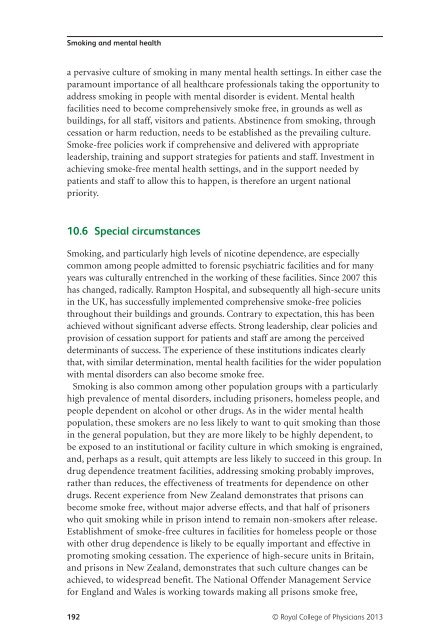Smoking and mental health - NCSCT
Smoking and mental health - NCSCT
Smoking and mental health - NCSCT
You also want an ePaper? Increase the reach of your titles
YUMPU automatically turns print PDFs into web optimized ePapers that Google loves.
<strong>Smoking</strong> <strong>and</strong> <strong>mental</strong> <strong>health</strong><br />
a pervasive culture of smoking in many <strong>mental</strong> <strong>health</strong> settings. In either case the<br />
paramount importance of all <strong>health</strong>care professionals taking the opportunity to<br />
address smoking in people with <strong>mental</strong> disorder is evident. Mental <strong>health</strong><br />
facilities need to become comprehensively smoke free, in grounds as well as<br />
buildings, for all staff, visitors <strong>and</strong> patients. Abstinence from smoking, through<br />
cessation or harm reduction, needs to be established as the prevailing culture.<br />
Smoke-free policies work if comprehensive <strong>and</strong> delivered with appropriate<br />
leadership, training <strong>and</strong> support strategies for patients <strong>and</strong> staff. Investment in<br />
achieving smoke-free <strong>mental</strong> <strong>health</strong> settings, <strong>and</strong> in the support needed by<br />
patients <strong>and</strong> staff to allow this to happen, is therefore an urgent national<br />
priority.<br />
10.6 Special circumstances<br />
<strong>Smoking</strong>, <strong>and</strong> particularly high levels of nicotine dependence, are especially<br />
common among people admitted to forensic psychiatric facilities <strong>and</strong> for many<br />
years was culturally entrenched in the working of these facilities. Since 2007 this<br />
has changed, radically. Rampton Hospital, <strong>and</strong> subsequently all high-secure units<br />
in the UK, has successfully implemented comprehensive smoke-free policies<br />
throughout their buildings <strong>and</strong> grounds. Contrary to expectation, this has been<br />
achieved without significant adverse effects. Strong leadership, clear policies <strong>and</strong><br />
provision of cessation support for patients <strong>and</strong> staff are among the perceived<br />
determinants of success. The experience of these institutions indicates clearly<br />
that, with similar determination, <strong>mental</strong> <strong>health</strong> facilities for the wider population<br />
with <strong>mental</strong> disorders can also become smoke free.<br />
<strong>Smoking</strong> is also common among other population groups with a particularly<br />
high prevalence of <strong>mental</strong> disorders, including prisoners, homeless people, <strong>and</strong><br />
people dependent on alcohol or other drugs. As in the wider <strong>mental</strong> <strong>health</strong><br />
population, these smokers are no less likely to want to quit smoking than those<br />
in the general population, but they are more likely to be highly dependent, to<br />
be exposed to an institutional or facility culture in which smoking is engrained,<br />
<strong>and</strong>, perhaps as a result, quit attempts are less likely to succeed in this group. In<br />
drug dependence treatment facilities, addressing smoking probably improves,<br />
rather than reduces, the effectiveness of treatments for dependence on other<br />
drugs. Recent experience from New Zeal<strong>and</strong> demonstrates that prisons can<br />
become smoke free, without major adverse effects, <strong>and</strong> that half of prisoners<br />
who quit smoking while in prison intend to remain non-smokers after release.<br />
Establishment of smoke-free cultures in facilities for homeless people or those<br />
with other drug dependence is likely to be equally important <strong>and</strong> effective in<br />
promoting smoking cessation. The experience of high-secure units in Britain,<br />
<strong>and</strong> prisons in New Zeal<strong>and</strong>, demonstrates that such culture changes can be<br />
achieved, to widespread benefit. The National Offender Management Service<br />
for Engl<strong>and</strong> <strong>and</strong> Wales is working towards making all prisons smoke free,<br />
192 © Royal College of Physicians 2013














